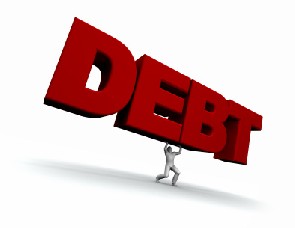| | Business 
[ 2016-07-28 ] 

Ghana’s debt soars by 200% in just 4 years
Ghana’s public debt stock has grown by a
whopping GHC70 billion representing a 200 per cent
increase in the last four years,Business
Finder’s analysis has revealed.
Total public debt moved from ¢35.1 billion in
2012 to GH¢105billon in March 2016 as confirmed
by the Minister of Finance, Mr Seth Terkper
recently.
This paper’s checks revealed that in a space of
two years (2012 to 2014), the national debt
increased by 117.4 percent from GHC35billion to
GH¢76.1 billion, equivalent to 67.1 per cent of
GDP from 48.8 per cent.
By June 2015, the total debt stock had reached a
high of GHC96.9 billion, representing 72.7 percent
of GDP.
The debt stock as at December 2015 stood at
GHC100billion, equivalent to 72.9 percent of GDP,
according to the Ministry of Finance.
Government sources indicate that only
GH¢5billion was added to the debt stock within
the first three months of 2016. Business
Finder’s checks however revealed that government
had borrowed GHC17.36billion by the end of the
first quarter.
It will be recalled that the Bank of Ghana (BoG)
in May this year published GHC99billion as the
country’s public debt level as at December
2015.
In spite of concerns about government’s
borrowing spree, Mr Terkper maintains it has been
able to slow down debt accumulation.
“We are proud to note that, for the first time
since the declaration of HIPC in 2001, we were
able to first, slow down the rate of growth of
debt accumulation between 2014 and 2015,” he
told Parliament on Monday.
He is confident debt management strategies will
help reduce the debt level substantially.
The Institute for Fiscal Studies (IFS) maintains
that the huge surge in the country’s public debt
stock is attributable to the large fiscal deficits
registered over the years, which were financed by
funds borrowed from both domestic and foreign
sources.
Executive Director of the Institute, Prof Newman
Kusi recalled that Ghana in 2014 continued to face
a moderate risk of debt distress, although the
overall debt vulnerabilities increased, and the
country’s debt service-to-revenue ratio was
approaching high-risk levels.
“Driven by loose fiscal policy, deteriorating
financing terms and external pressures, several of
the country’s domestic and external debt
indicators also deteriorated; total public debt
service-to-revenue ratio was not only on a rapidly
increasing path but had breached its indicative
long term threshold,” he pointed out.
Commenting on the issue, Economist at the
University of Ghana, Legon, Dr Eric Osei Assibey
described Ghana’s debt situation as a very
difficult one, “particularly looking at the
precarious nature of government’s financing
needs.”
According to him, “It’s worrying because it
is obvious that the economy is not doing well;
businesses are suffering; energy challenges remain
unresolved and so if the productive sectors are
not working there is no way we can generate enough
revenue to support developmental projects.”
Government must realise it cannot spend what it
doesn’t have and must reduce its expenditure to
conform to its revenue generation; this is the
easiest way of avoiding a debt overhang.
Dr Assibey reminded government “you cannot say
you are pursing fiscal consolidation and still
maintain loose expenditure levels, particularly
when your revenues are low.”
He warned against government’s resort to
increasing taxes in a bid to rake in more revenue,
noting that “frequent increment in taxes is
itself inimical to the performance of the economy
because high tax revenue has been shown to stifle
economic growth as it increases tax avoidance,
evasion and fraud.”
The economist reminded government that Ghana’s
deal with the IMF spelt out clearly that
government’s expenditures should be limited to
priority areas of the economy. Source - thefinderonline.com

... go Back | |




